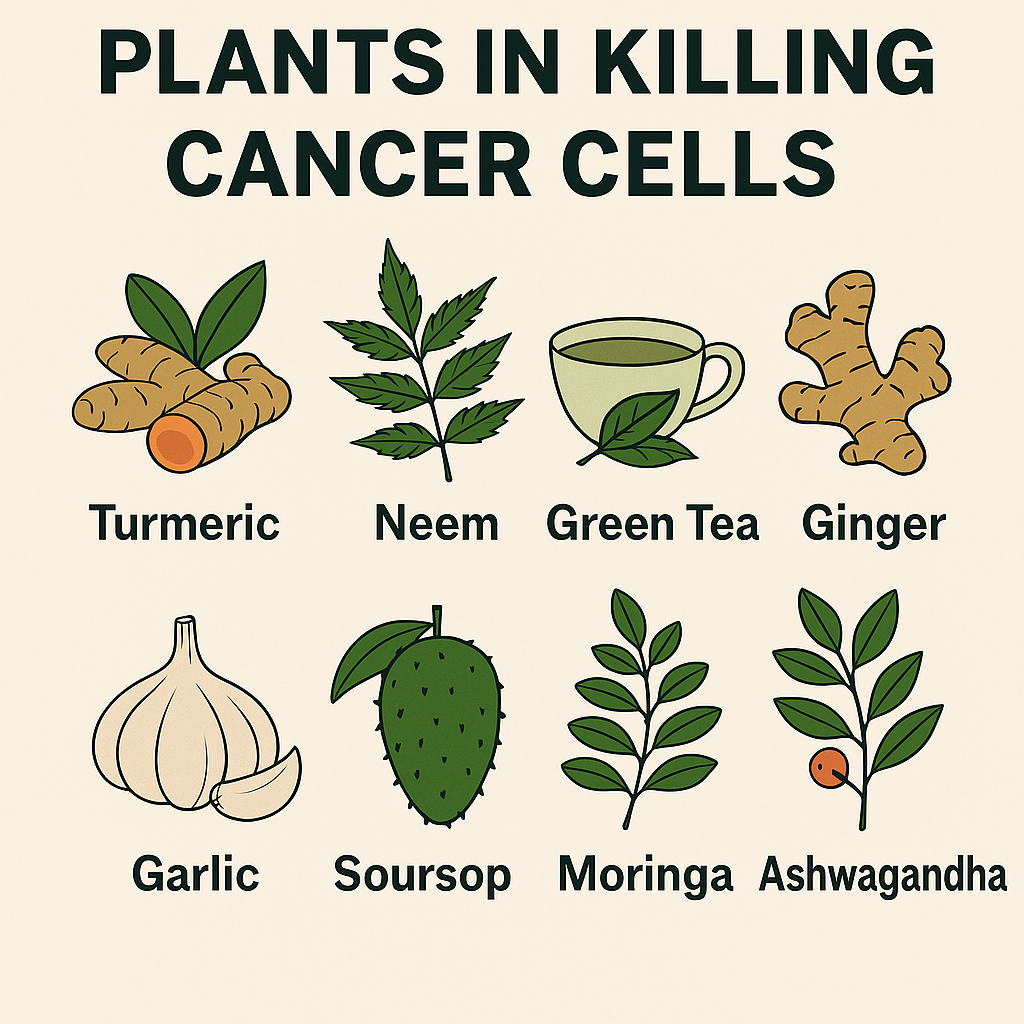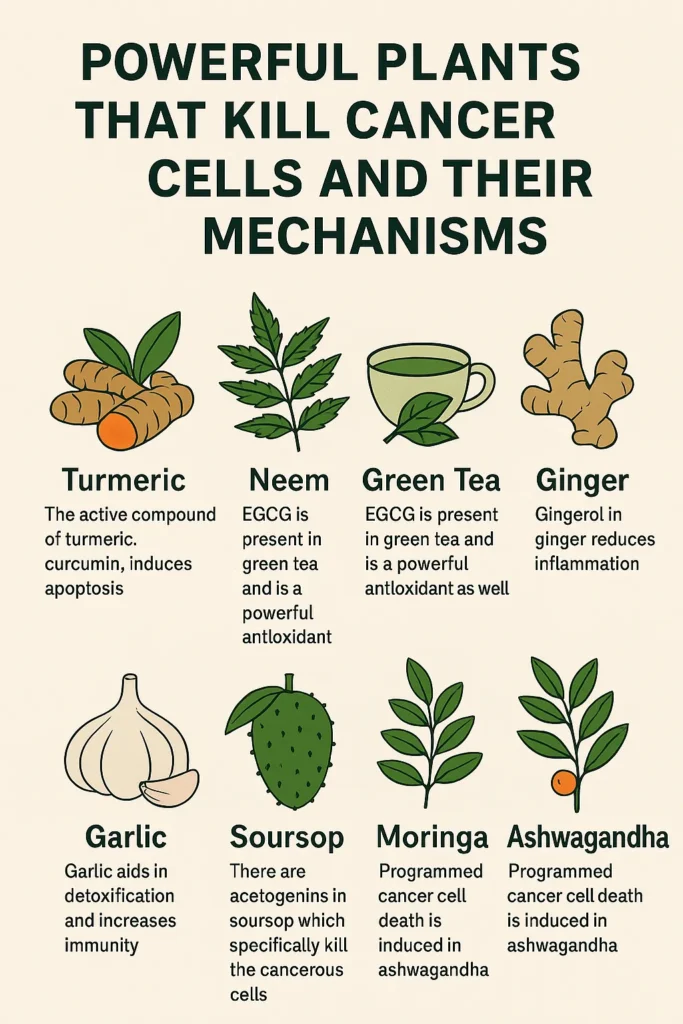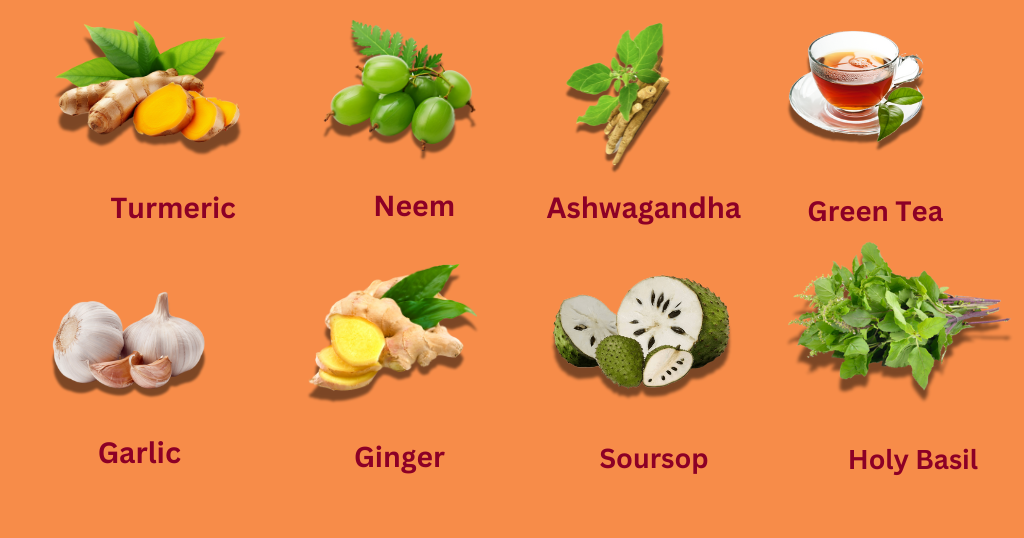Understanding the Role of Plants in Killing Cancer Cells

Natural compounds occur in plants that kill cancer cells. They stop tumors, induce apoptosis, and promote immunity. They have been studied for decades by scientists. They are traditional medicines used in different cultures.
History of Using These Plants for Cancer Treatment
✴️ Turmeric—Turmeric has been used for healing in ancient Ayurvedic and Chinese medicine. Centuries ago, its role in cancer treatment became known. Historical texts mention that turmeric can reduce inflammation and detoxify the body.
✴️ Neem—Neem is described as a disease-fighting herb in Indian medicinal texts. Healers also used neem extracts to treat infections, chronic diseases, and gingivitis. However, neem became known over the years for its anti-cancer properties.
✴️ Green Tea- Green tea was respected as an important health resource in traditional Chinese medicine. In ancient times it was used by ancient healers to enhance immunity. Later research proved the compound’s capacity to fight cancer.
✴️ Ginger—Ginger has been used in Ayurvedic medicine for thousands of years. Practitioners recommended it for digestion and inflammation. Modern studies have also proven that it is effective in reducing the growth of cancer cells.
✴️ Garlic- Garlic is recognized as having medicinal properties by Egyptians and Greeks. It was used to increase immunity and prevent illnesses. However, recent studies have established that garlic serves to stop tumor formation.
✴️ Soursop- Soursop has been used for healing by indigenous people of South America for a very long time. It could treat all infections and some tumors. Its anti-cancer properties are supported by modern research as well.
✴️ Moringa- Moringa was valued for its nutrients by traditional Indian/African medicine. It became an important herb for the treatment of different diseases. Now scientists see if the cancer-fighting potential of this substance is worth studying.
✴️ Ashwagandha- The herb has been used for centuries in ayurvedic medicine. The body was strengthened and the stress was reduced. It could slow down the growth of the cancer cells, recent studies say.

🔸 Turmeric- The active compound of turmeric, curcumin, induces apoptosis. It blocks the cancer cells from spreading. It has been observed that studies show that turmeric reduces inflammation and oxidative stress.
🔸 Neem- Neem stops cancer cell growth and boosts the immune system. It prevents tumors from forming and helps natural defences.
🔸 Green Tea- EGCG is something that is present in green tea and is a powerful antioxidant as well. This compound stops cancer cell reproduction and halts the development of new tumors.
🔸 Ginger- Gingerol in ginger reduces inflammation. It shuts down the cells that grow cancer and stops tumors from becoming worse.
🔸 Garlic- Garlic aids in detoxification and increases immunity. Sulfur compounds of the herb attack cancer cells and slow tumour growth.
🔸 Soursop- There are acetogenins in soursop that specifically kill the cancerous cells. It is safe for healthy cells and small tumors.
🔸 Moringa- Moringa strengthens the immune system. This limits the growth of the cancer cells and slows the progression of the disease.
🔸 Ashwagandha- Programmed cancer cell death is induced in Ashwagandha. In addition, stress can play a role in cancer growth and stress is reduced.
Correct Way to Use These Plants for Cancer Treatment
Turmeric- Eating turmeric with black pepper is more effective in absorption. Use it in a tea, smoothie, or meal.
Neem- If you do not want to drink neem juice then you can chew raw leaves. Neem capsules are also available which provide benefits.
Green Tea- Drink warm brew of fresh green tea. Do not add milk as it cuts down on its effectiveness.
Ginger- Drinking tea or having meals with fresh or dried ginger can be done. Ginger supplements offer various benefits.
Garlic- Crush the garlic and wait for 10 minutes before consuming. Eat it raw or add it to food.
Soursop- Fresh soursop fruit or its juice can be taken. Herbal extracts of soursop also provide benefits.
Moring- One can use moringa powder in smoothies and soups. Salads can also be made with fresh leaves.
Ashwagandha- It is taken with warm water or milk as powder. Capsules also work effectively.
Best Time to Consume These Plants for Maximum Effect
- Turmeric: Morning and night for inflammation control.
- Neem: Early morning on an empty stomach.
- Green Tea: Between meals for better absorption.
- Ginger: Before meals to improve digestion.
- Garlic: Consume raw in the morning.
- Soursop: Mid-morning for sustained benefits.
- Moringa: Before breakfast for maximum absorption.
- Ashwagandha: Relaxation and healing support by evening.
Duration: How Long Should These Plants Be Used for Cancer Prevention?
- Turmeric, Neem, and Green Tea: Safe for daily, long-term use.
- Ginger and Garlic: Consume regularly in controlled amounts.
- Soursop: Due to potency, short-term use only.
- Moringa and Ashwagandha: Best taken in cycles for effectiveness.
Ideal Diet to Follow Alongside These Plants for Better Results
- Turmeric, Neem, and Green Tea: Helpful for those foods that are rich in fiber for digestion support.
- Garlic, Ginger, and Soursop: Better to complement with protein and healthy fats for better absorption.
- Moringa and Ashwagandha: Complement with protein and healthy fats for better absorption.
At Which Stage of Cancer Can These Plants Be Used?
- Early-stage cancer: Turmeric, Neem, and Green Tea provide preventive benefits.
- Advanced-stage cancer: Garlic, Soursop, and Moringa offer support alongside medical treatments.
- Post-treatment recovery: Ashwagandha and Ginger help rebuild strength and immunity.
Scientific Studies and Research on These Cancer-Fighting Plants
- Studies confirm Turmeric and Neem’s role in reducing cancer risk.
- Research highlights Green Tea and Ginger’s ability to slow tumor growth.
- Clinical trials support Garlic, Soursop, and Moringa’s cancer-fighting effects.
- Scientists continue exploring Ashwagandha’s impact on cancer cell apoptosis.
Also Read
- Garlic: Dosage Uses, Risk and Side Effects
- Fighting Cancer Naturally
- Ayurvedic Diet for Cancer Patients
- Herbal Remedies for Cancer Care
